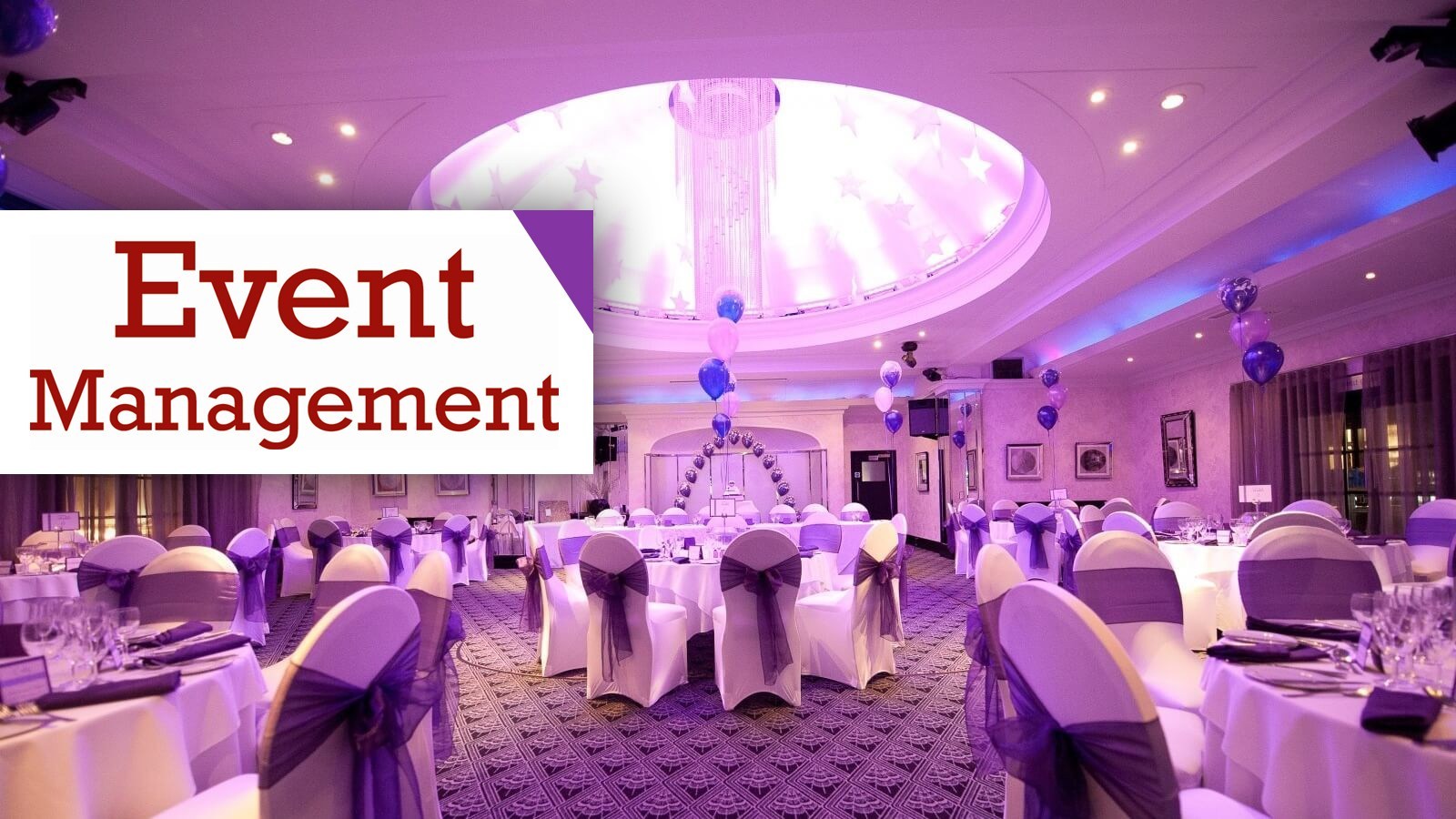A Deep Study Exactly How Event Management Works to Develop Remarkable Experiences
Event management is a complex technique that integrates numerous aspects to craft memorable experiences. It calls for a clear understanding of the event's objective and audience. Organizers must browse budgeting, logistics, and advertising to assure a seamless execution. Each component plays a crucial role in attaining the preferred influence. The journey does not finish with the event itself. There are insights to reveal that can form future undertakings.
The Fundamentals of Event Management
Effective event management incorporates a variety of crucial concepts that assist the preparation and execution of successful occasions. At its core, it entails comprehending the event's objective, target market, and preferred results. Recognizing the target market is critical, as it educates choices associated to web content, advertising, and logistics.
Budgeting is one more basic facet, ensuring that sources are assigned effectively while fulfilling the event's purposes. This includes preparation for unanticipated expenses that may arise.
Time management plays a crucial function, as event managers must establish a thorough timeline to coordinate numerous jobs and milestones.
Additionally, effective interaction among stakeholders, vendors, and group members is necessary to guarantee placement and stay clear of misconceptions.
Danger management should be considered, with backup strategies in area to deal with possible challenges, therefore boosting the overall experience for participants and assuring a seamless implementation of the event.
Secret Functions in Event Planning
In event preparation, comprehending key roles is vital for successful execution. The event coordinator is accountable for overseeing logistics and making sure all aspects line up with the vision. In addition, reliable supplier management is vital for preserving top quality and fostering solid collaborations throughout the planning process.
Event Organizer Obligations
An event organizer orchestrates the complex components of event planning, ensuring seamless implementation from conception to final thought. They are in charge of conceptualizing the event style, setting budget plans, and creating timelines to maintain the task on track. Sychronisation with stakeholders, consisting of clients, location managers, and volunteers, is necessary to straighten expectations and help with interaction. The organizer additionally oversees logistics, such as event catering, transportation, and innovation requires, ensuring all parts work sympathetically. They perform site brows through, manage routines, and troubleshoot concerns that might occur throughout the event. Post-event, the organizer reviews the event's success, gathering responses and assessing results to educate future projects. This diverse duty calls for solid business abilities, interest to information, and efficient interpersonal interaction.
Vendor Management Basics
Guiding via the landscape of supplier management is crucial for successful event planning. Efficient vendor management entails determining, selecting, and working with distributors that supply crucial solutions, such as wedding catering, audiovisual assistance, and design. Event organizers need to preserve solid interaction with suppliers to ensure that all aspects straighten with the event's vision. Secret roles consist of the vendor manager, that supervises contracts and negotiations, and the logistics organizer, liable for on-site arrangement and implementation. It's necessary to develop clear assumptions and timelines, cultivating a joint environment that enhances the general experience. By focusing on these aspects, event organizers can browse potential difficulties, making sure that every detail adds to a smooth and unforgettable event.
Crafting a Vision: Idea Development

When a vision is developed, it ends up being vital to translate it right into actionable parts. This includes defining the environment, selecting appropriate venues, and establishing the event's style. Collaborating with stakeholders, including sponsors and companions, additionally improves the principle, making certain that all events share a linked understanding of the event's purpose. Ultimately, a strong vision not only enhances attendee interaction but additionally establishes the phase for remarkable experiences that reverberate long after the event concludes.
Budgeting and Source Appropriation
With a clear vision in position, the next action in event management includes careful budgeting and resource allowance. This essential stage warranties that all necessary parts are funded and lined up with the event's goals. Event managers start by estimating prices connected with venue choice, wedding catering, entertainment, and advertising and marketing. They create a thorough budget that lays out each group, permitting openness and responsibility.
Resource appropriation prolongs past funds; it also encompasses human sources. Determining group duties, responsibilities, and timelines is vital to guarantee efficiency. Event managers should also consider backups for unanticipated expenses or modifications in scope, developing a barrier within the spending plan.
Moreover, prioritizing spending on aspects that enhance visitor experiences is important. By tactically alloting sources, event managers maximize impact while maintaining financial control. This regimented method not just fosters effective events yet likewise develops reliability and trust with stakeholders and participants.
Logistics: The Foundation of Event Implementation
While budgeting prepares for an event, logistics act as its foundation, guaranteeing that every aspect is executed efficiently and successfully. charlotte event companies. This includes a vast array of tasks, consisting of place option, transport arrangements, and devices procurement. Efficient logistics management needs thorough preparation and coordination to assure that all components straighten with the event's timeline and purposes
Key elements of logistics include supply management, where supplies and products are tracked to stop scarcities, and staffing, which includes recruiting and training personnel to take care of different tasks. Communication is also essential, as it facilitates collaboration among suppliers, sponsors, and the event team.

Advertising and Promo Techniques
Efficient advertising and marketing and promo approaches are crucial for making best use of attendance and engagement at an occasion, as they generate passion and excitement among possible participants. Event supervisors utilize a mix of traditional and electronic marketing strategies to reach their target audience. Social media systems, email campaigns, and targeted ads are frequently made use of to produce buzz and foster area interaction. Collaborations with influencers or market leaders can boost reliability, while engaging web content such as video clips and reviews can get more resonate with possible guests.
On top of that, leveraging event-specific hashtags and producing shareable graphics motivates natural promotion among guests. Early bird ticket offers and unique promos can incentivize enrollment, additionally increasing interest. A well-designed site that provides easy navigation and clear details concerning the event can improve the customer experience. By implementing these marketing and promotion techniques, event managers can ensure higher presence and ultimately create a memorable experience for all participants.

Measuring Success: Responses and Examination
Success in event management rests on durable feedback and assessment mechanisms. These processes are essential for figuring out the effectiveness of an event and determining locations for improvement. By gathering input from attendees, organizers can analyze satisfaction levels, understand preferences, and assess general effect. Studies and meetings offer as important tools for gathering measurable and qualitative data, enabling for complete analysis.
Furthermore, assessing crucial efficiency signs (KPIs) such as attendance rates, interaction levels, and roi (ROI) provides a clearer image of event success. Post-event debriefing sessions with the preparation team also add understandings, fostering a society of continual renovation.
Ultimately, a methodical approach to feedback and assessment not only enhances future events but additionally strengthens connections with stakeholders. By applying these strategies, event managers can produce memorable experiences that resonate with participants and drive ongoing engagement.
Frequently Asked Inquiries
How Do Event Supervisors Manage Unanticipated Difficulties Throughout an Occasion?
Event supervisors resolve unforeseen challenges by staying calmness, assessing the scenario, and executing contingency strategies - charlotte event companies. They communicate properly with their team, adapt swiftly, and prioritize solutions to guarantee the event continues efficiently and effectively
What Innovation Devices Are Important for Modern Event Management?
Essential innovation devices for contemporary event management consist of event enrollment software, job management applications, attendee interaction platforms, and analytics tools. These resources enhance procedures, enhance communication, and boost total event experiences for coordinators and participants alike.
Exactly How Do Social Differences Influence Event Preparation and Implementation?
Cultural distinctions greatly influence event planning and implementation. They impact motifs, customs, interaction designs, and assumptions, requiring tailored techniques to ensure inclusivity and respect, eventually forming look at this website the overall experience and success of the event.
What Are the Moral Factors To Consider in Event Management?
Ethical considerations in event management incorporate transparency, sustainability, cultural sensitivity, and inclusivity. Planners should focus on justness, respect varied target markets, lessen environmental that site effect, and warranty accessibility to create liable and memorable experiences for all participants.
How Can Sustainability Be Integrated Into Event Preparation?
Sustainability can be integrated right into event planning by using eco-friendly materials, decreasing waste, sourcing local suppliers, implementing carbon balanced out programs, and advertising digital services to decrease paper use, thereby enhancing environmental consciousness within the event's structure.